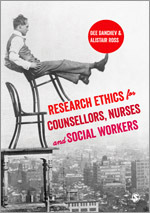Research Ethics for Counsellors, Nurses & Social Workers
- Dee Danchev - Nuffield College, University of Oxford, UK
- Alistair Ross - Kellogg College, University of Oxford, UK
Counselling Ethics and the Law | Legal/Ethical Issues in Social Work | Nursing Research
Research Ethics for Counsellors, Nurses & Social Workers is designed to help you make the best start in your research career. With ethical implications and considerations arising at each stage of the research process, engaging with the wide range of issues and ideas can often prove a challenge. Dee Danchev and Alastair Ross will help you overcome this challenge and become confident, skilled researchers by providing you with:
-An in-depth explanation of the theoretical base for a range of ethical demands and approaches, equipping you with the tools to make the right decisions for your project.
-Key research ethics findings so students can apply the latest thinking to your research practice.
-Short case examples and checklists to help you apply theory to practice and reflect on what you have learned.
-Further reading and important resources to support your continued learning.
Whether you are an experienced researcher or coming to research for the first time, this highly practical, step by step guide, is a must for your bookshelf.
Dee Danchev is a counselling psychologist and Pastoral Advisor at Nuffield College, Oxford.
Alistair Ross is Director of Psychodynamic Studies and Dean of Kellogg College, Oxford.
In a clear, very readable style, this book covers everything students or practitioners would need to consider about research ethics. It is up to date and rich with examples from cross-professional and multidisciplinary practice. I would recommend it for therapists, and professionals in health and social care interested in ethical research practices.
This book provides a thoughtful approach to research ethics that will appeal to a range of different researchers. The style is clear and practical with illuminating vignettes and challenging questions in each chapter. This clarity together with the depth in underpinning ethics with philosophical and historical ideas will appeal to beginning and experienced researchers at a range of academic levels. An excellent text for anyone within the social science disciplines.
The real strength of the book is its conscientious unpicking of the research process via an ethically-informed lens. Addressing ethical issues is very much seen and presented as a process, as, for example, in obtaining informed consent, leading up to the a very useful discussion about the ethics involved in getting your research findings out into the real world. This stage is often missing from many student research proposals in my experience.
Very clear and accessible journey through all the parts in a research process that require us to be ethically mindful- in particular for working with people (including ourselves!)
This is a great resource for anyone teaching ethics, and for anyone looking for accessible guidance for their own studies. My learners have worn my copy out; all have commented that it is easier to understand than my mumblings! This should be on your bookshelf.
Good text which is logically explained.
Recommend for students formulating ethical approval proposals and for appreciation of the complexity of the process.
This book is strong on the reflective aspects of of research ethics and would make a good reference guide for practitioners. Not sure if it would integrate well into a taught course on research for practitioners.
This book provides a very easy to read and useful guide about the ethical considerations involved in undertaking social work research. It will help students to consider the ethical principles and processes involved in designing their research project. However, it also encourages students to become reflexive researchers. I will be recommending it on the MA Social Work Dissertation module at the University of Wolverhampton.
I will recommend this book for any Masters students that I supervise
This book is an excellent introduction to the ethical considerations students will need to be mindful of as they begin to conduct research in Social Work/Social Care settings. It's specificity to the service user groups who may be involved is truly invaluable.






